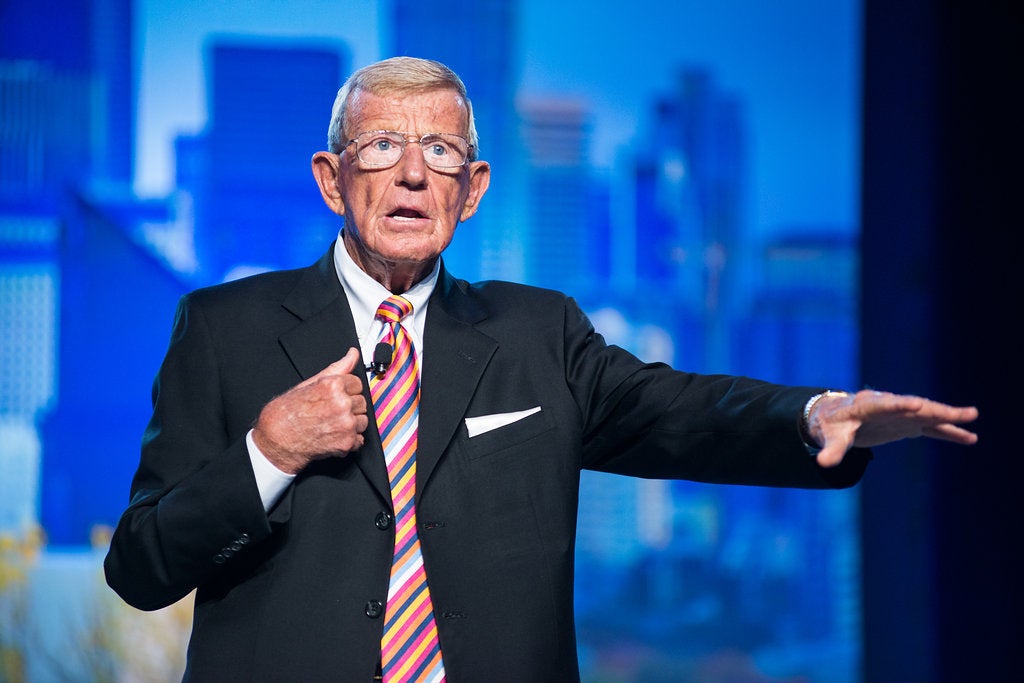ASHE Annual Conference kicks off with a winning game plan

Lou Holtz delivers message at ASHE conference on planning for success.
Photo courtesy of ASHE
Famed, former football coach Lou Holtz kicked off the 55th American Society for Health Care Engineering’s (ASHE) Annual Conference and Technical Exhibition this morning with a keynote addressing the theme Game Plan for the Future of Health Care Facilities. The conference has attracted nearly 4,000 attendees dedicated to optimizing the physical environment.
Holtz spoke on lessons learned during his decades-long career of developing winning college football teams. First the College Football Hall of Famer gave five habits of an effective leader:
- Set your vision
- Determine the talents necessary to achieve it
- Identify bad habits that need to be eliminated along the journey
- Recruit the necessary people to get the job done
- Formulate a plan to reach the vision
Holtz also gave his three rules to build a winning team:
- Do what’s right
- Do everything to the best of your ability with time allotted
- Show people that you care
This morning’s general session also featured a recognitions given by current ASHE President Bradley Taylor, MBA, CHFM, CHC. Taylor presented the ASHE President’s Award to COO of MSL Healthcare Partners Susan B. McLaughlin, CHSP, FASHE, MT (ASCP) SC, CHFM. The ASHE Crystal Eagle Award was given to George L. Thomas, FASHE, CHFM, LSCS.
During the session, Taylor encouraged attendees to reunite with old friends while also forming new connections. “Another way for us to grow is to move past our comfort zones,” Taylor said. “The more people you can meet here, the more people you can call on when a challenge arises at your facility back home.”
Conference attendees also met the ASHE president-elect candidates for 2019: Jeffrey E. Henne, CHSP-FSM, CHEP, CHC, FASHE; Devin J. Hugie, CHFM, CHC, CHSP-FSM, CHEP, FASHE; and Antonio Suarez, MBA, CHFM, FASHE. ASHE members can cast their vote for president-elect and several board member positions beginning July 20 at ashe.org/elections.
The afternoon general session, Recovery: The Long Road Ahead Following a Catastrophic Event, focused on lessons learned by three hospitals following a disaster. Steve Spaanbroek, MBA, FASHE, CHFM, CHC, managing director at MSL Healthcare Partners led the discussion. Spaanbroek was joined by Don Stevens, CHFM, CHC, executive director, regional support services & chief energy officer, Northern California, Kaiser Permanente; Bert M. Gumeringer, MBA, MS, CHFM, FASHE, vice president, facilities engineering & support services for Texas Children’s Hospital; and Paul Mitchell, CHFM, CHSP, administrative director of facilities management, Sunrise Hospital & Medical Center and Sunrise Children’s Hospital.
In the session, Stevens discussed Kaiser’s strategy in facing the Santa Rosa fires, while Gumeringer recounted his hospital’s experience in the wake of Hurricane Harvey. Mitchell relayed his experience during and following last year’s Route 91 Harvest Musical Festival in Las Vegas.
Much of the session’s discussion centered on logistical matters. For instance, Mitchell says his system is now reviewing plans to upgrade its infrastructure to handle an incident command and communication system. Gumeringer says for years he would request a boat for high-water rescues as part of his capital plans. Prior to Hurricane Harvey, the request was met with skepticism. Following Hurricane Harvey, his request was granted. Stevens advised attendees to begin with supplies that have the longest lead time when reordering inventory following a disaster.
All three speakers recommended negotiating contracts with vendors and contractors rather than forming memorandums of understanding (MOU). Stevens explained that when a disaster strikes, clients with contracts are prioritized. Gumeringer says opting for a contract rather than an MOU also improves performance among vendors because they have a clear understanding of what is expected.
Just as important as physical rebuilding, the session also focused on the human element and the importance to rebuild emotionally, as well. Mitchell called the environmental services (ES) workers within his facilities “the unsung heroes” for their willingness to push beyond their normal service.
The Las Vegas hospital treated 242 patients after the shooting and performed 56 surgeries in 25 hours. Mitchell says the ES crew was able to turn around emergency rooms and operating rooms in quicker speed than usual. After such an event, Mitchell says it’s important to be sensitive to the post-traumatic stress many employees may be suffering.
“You need to have a certain level of sensitivity, and we are being a little more thoughtful on how we program certain things,” he says.

